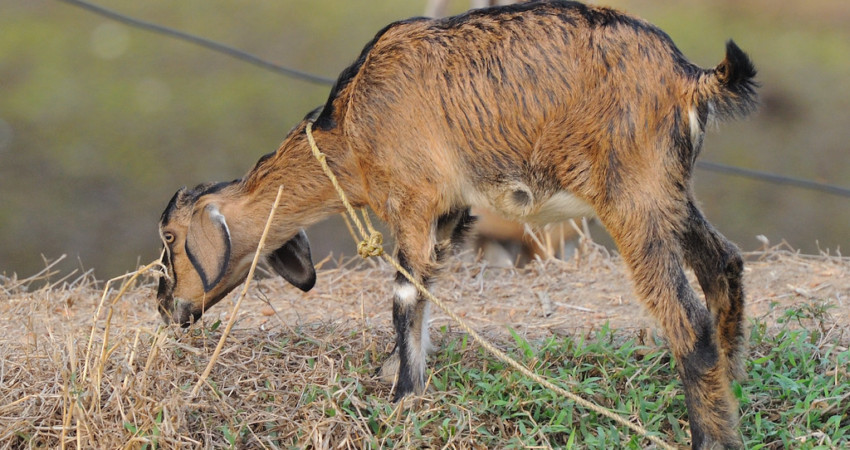

Many of the people who tether goats genuinely think goats are tough creatures that will eat anything, but in fact they are remarkably fussy eaters, and they have a miserable life for many reasons. They usually have insufficient food and water, they are always lonely, they are often cold and miserable, and they are very much at risk from thieves, dogs and vehicles
Goats don’t have a layer of fat under their skin as sheep do, and their coat is not greasy like wool so it’s not so waterproof. For these reasons they really suffer in cold wet weather. Tethered goats are particularly at risk from the elements, and they must be provided with a robust weather-proof hut. Don’t forget to clean the hut out regularly if it has a solid base or move it frequently if it hasn’t. Goats will spend a lot of time in their shelter when the weather is bad and it will get very dirty inside.
Tethered goats often don’t get enough food and water. Goats must get fresh browse or pasture every day and they are surprisingly fussy eaters. They may have a good appetite for young trees and the growing tips of expensive plants, but they don’t like soiled food. The grass that grows by the roadside is often dusty, oily and rank. It is not good feed unless there is plenty of it and the goat is moved frequently. Tethered goats need to have clean water available to drink at all times, especially when conditions are dry. The water container should be secured so that it can’t tip over easily.
Goats are intelligent social creatures, and they really like the company of other animals and preferably other goats. Solitary goats will be lonely. If a goat is to be tethered, it should be very tame, preferably hand-reared, and it should be given a lot of attention.
Tethered goats are vulnerable. Tethered goats are very much at risk of theft and of attack by dogs. They should be supervised at all times and brought close to home at night and at any other time when they can’t be supervised. The tether should not be long enough to allow the goat to wander onto the road where it could be hit by a vehicle and/or cause an accident. They shouldn’t be tethered beside gravel roads where they can’t get away from the dust stirred up by traffic. They are at risk of becoming tangled in their tether or even strangled by it, so they shouldn’t be tethered on banks because of the risk of them being strangled if they should jump off, and they shouldn’t be tethered near any object the rope could become tangled around.
Like sheep and all other goats, tethered goats may need anthelmintic drenches to get rid of internal worms. Your vet will advise how often you should drench them. Their hooves should be trimmed at least once a year, and sometimes more often if the horn grows rapidly. Angora-type goats must be shorn every year.
 Contact Jaguza Support
Contact Jaguza Support